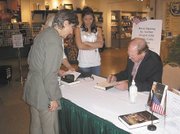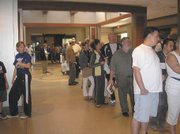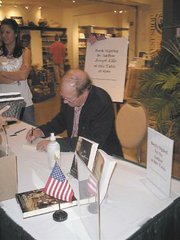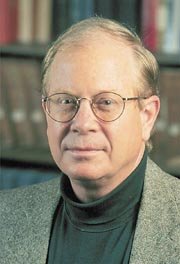They started lining up at 3:30 p.m. The author was not due until 4 p.m. And, in fact he didn't appear until 4:15 p.m. But, that didn't deter those avid admirers of one of the nation's most accomplished authors of American History and those who delivered the new nation from the womb of English/European culture.
Pulitzer Prize winning author, Joseph J. Ellis, came to Mount Vernon Estate & Gardens Monday afternoon to sign copies of his various books on sale in The Shops at Mount Vernon. Among those works is "Founding Brothers" for which he was awarded the 2000 Pulitzer Prize.
His other works include "His Excellency," a landmark biography of the man whose home he was visiting; "American Sphinx: The Character of Thomas Jefferson," which won the 1997 National Book Award;"Passionate Sage:The Character and Legacy of John Adams;" and his most current effort, the 2008 "American Creation."
A resident of Amherst, Massachusetts, where he resides with his wife, Ellen, and their three sons, Ellis has taught at Mount Holyoke College since 1972 as a Ford Foundation History Scholar. His visits to Mount Vernon are visits home for Ellis. He was born and raised in Alexandria, attended St. Mary's School and graduated from Gonzaga High School in the District of Columbia.
He received his undergraduate education at the College of William & Mary in Williamsburg where he graduated with a bachelor's degree in philosophy. He earned his doctorate in history from Yale University.
"When I was in the Army they assigned me to teach American History at West Point. I was there from 1969 to 1972. It was during the latter part of the Vietnam War," Ellis said.
The author's grasp of not only the events which formed this nation but also the personalities intimately involved in the process, as portrayed in his Pulitzer Prize work "Founding Brothers," have been lauded by critics across the nation.
That praise was borne out by his admirers in line Monday afternoon. "My husband is a constitutional scholar for the Bill of Rights Institute in Arlington -- I'm getting this for him," said Sandra Helm of Alexandria as she clutched a copy of "His Excellency."
"I'm reading "Founding Brothers" for the third time. I borrowed it from a friend and its getting rather worn so I came today to get a new copy and have it signed. I'm going to give this signed copy to my friend as a thank you. Ellis is a terrific writer," said Jim Carmalt, locker room manager, Belle Haven Country Club.
A moment of camaraderie occurred when Malcolm Lillywhite, a native of Arlington, appeared before Ellis to have his book signed. Looking up Ellis reacted with surprise and admiration proclaiming to the rest of the crowd, "Now this is a legend in his own time!"
Ellis and Lillywhite were fraternity brothers at the College of William and Mary. "He was my fraternity buddy, party colleague and true college friend," Lillywhite said.
"I was working on a NASA astrophysics program when he was at Yale. My travels took me up there and we would visit periodically. I can honestly say, he made the absolute most of his liberal arts education and training from William and Mary," Lillywhite said, who now lives in Evergreen, Colorado.
The works of Joseph Ellis might well be summed up in the last paragraph of "Founding Brothers." In characterizing the death of John Adams and his belief that his mortal adversary, Thomas Jefferson, had outlived him, Adams stated, "Thomas Jefferson still lives."
Ellis notes, "He was wrong for the moment but right for the ages." Ellis' insights to the American government experiment's commencement, and those who shaped it, with all their warts and baggage, are both right for the moment and right for the ages.



